
Summarize Content With:
Quick Summary
Have you ever wondered, how can you stay updated on the latest sales trends along with giving your all to a full sales pipeline? However, even after staying updated it might get difficult to share personalized speech to every new individual. But did you know you can always opt for conversational AI to increase your productivity too while saving your time, money, and hardwork.
In this post, we are going to learn conversational AI has changed the world for retails, sales and customer service.
Introduction
Just as human AI has evolved over time, by closing deals with the same script using telephone and messages to using AI call assistant for curating a tailored experience for each customer. Conversational AI helps you understand your potential lead and their preferences, which in turns make them your potential customer too. Conversation AI tools have become digital team mates that never take rest and don’t even get overwhelmed with the workload. Let’s understand what it really is and how can we use it more efficiently?
What is Conversational AI?
Conversational AI is a technology, which helps machine to learn, understand, process, and respond to human language in a most natural and contextual way. It blends Natural Language Processing with machine learning to give desirable output of imitated human interaction.
At the beginning, chatbots and AI assistants were only able to answer simple and repetitive questions, which used to follow simple rules such as, “How is the weather today?”. But as time went by, AI evolved with machine learning and now it can perform even demanding tasks.
How Does it Work?
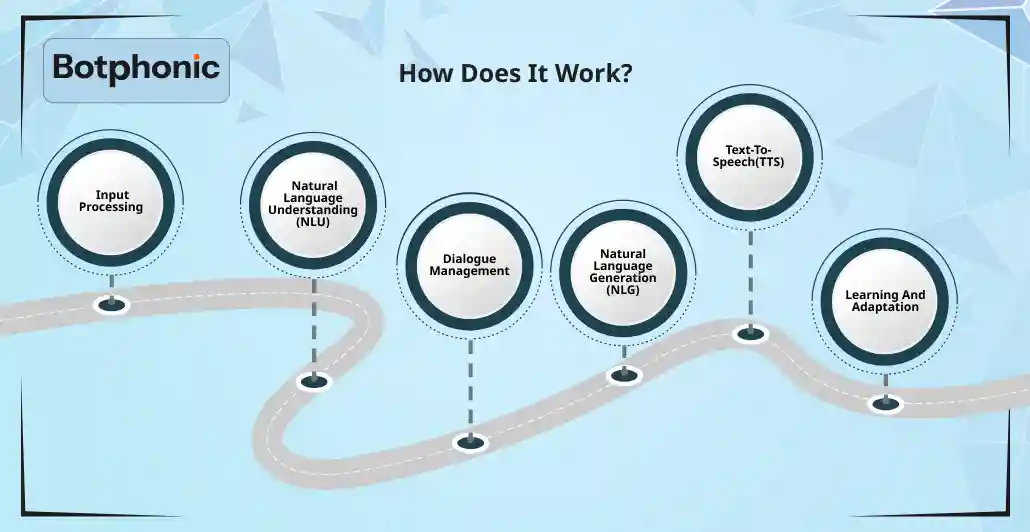
It usually refers to a combination of technologies which helps machines learn and respond to language that is easy to understand. It often uses natural language processing and even large language models.
Let’s understand how conversation AI works?
1. Input Processing
By input processing it refers to the prompt given by the user or the consumer for instance,
- Text Input: If the user types a message, for example “What’s the time right now?”, the system directly processes it and gives you a response.
- Voice Input: If the user is using voice commands as in AI talking such as Siri or Alexa, the system uses Automatic Speech Recognition to convert the same into text and proceeds with the solution.
2. Natural Language Understanding(NLU)
The system tries to analyze the input command and understands the following:
- Intent: What the user is trying to do?(The information he is seeking)
- Entities: The key information asked to show such as, time or place.
This step has its own few conditions that it goes through:
- Syntax Analysis: It checks the grammar or parts of speech
- Semantic Analysis: It analyzes the meaning behind the prompt.
- Context Tracking: It checks through the previous conversation history and user data to know the context of recent prompts.
3. Dialogue Management
This component helps decide what to say or do after the command is received, based on:
- The user’s intent of question
- The previous data or conversation
- Pre-defined rules or learned dialogue patterns of user
4. Natural Language Generation(NLG)
This part is where a response or several options are generated by the system, in human language which makes it easier to understand for the user. It
- Selects content that need to be shown, such as facts, answers, or actions
- Chooses wording and sentence structure
- Gives output in a grammatically correct sentence, such as “It’s 9:41 AM.”
5. Text-to-Speech(TTS)
This component only comes in command when the prompt is given in voice, when the system is speaking like Alexa, it converts the generated text into spoken language using TTS.
6. Learning and Adaptation
Modern conversational AI, for instance ChatGPT or Google Assistant use machine learning. They use especially large language models which are trained on extensive datasets, to:
- Learn grammar, facts, and other significant patterns of human dialogue.
- Adapt to new topics and styles of speech for the user
- Improve with time using user feedback and fine tuning
Real World Examples:
- Rule based bots: These are usually ai powered customer support, which follow pre-set flows.
- AI assistants(ChatGPT, Siri): It uses deep learning to generate more flexible and human-like responses which makes it comparatively easier to understand than machine language.
What are Retail Services?
Retail services are activities and support which are provided to customers during the buying and selling of goods in a retail environment such as stores, e-commerce platforms, or even the marketplaces. They usually focus on enhancing the shopping experience, and not just the product themselves.
Few Examples of Retail Services:
- Customer support
- Personal shopping assistance
- Checkout and payment processing
- Loyalty programs
- Delivery and tracking updates
- Product recommendations
- In-store or online chat support
Why Conversational AI Matters in Retail Services?
Conversation AI is transforming the era of customer interaction with its AI call assistants, chatbots and virtual shopping agents. They are providing a faster, smarter and more personalized service to customers.
Benefits of Using Conversational AI in Retail Services
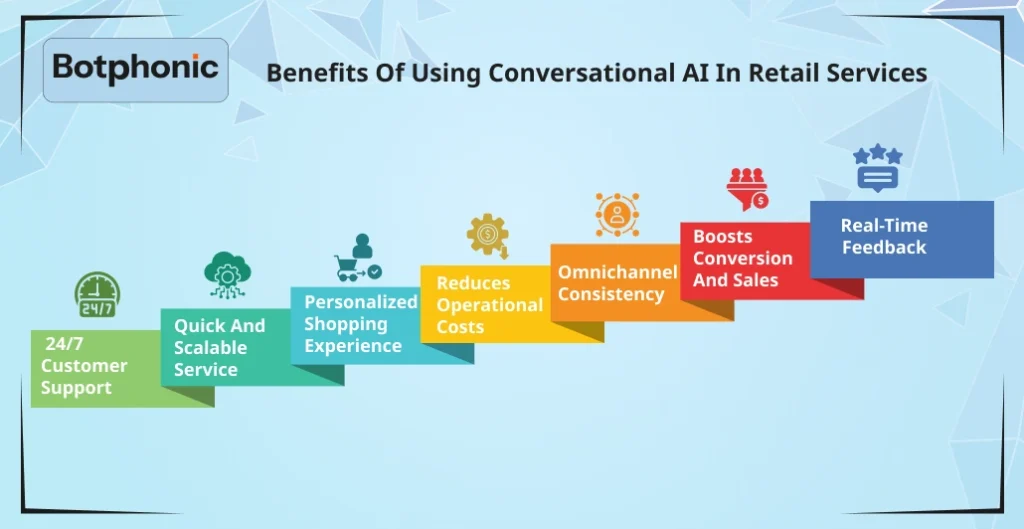
1. 24/7 Customer Support
- AI customer support can help you manage and handle queries efficiently any time of day, even during holidays or when you are not present for some reason.
- It helps reduce waiting times and supports customers on a global level across time zones.
2. Quick and Scalable Service
- By using AI tools for customer service, you can handle thousands of conversation queries simultaneously such as by using chatbots, it can provide answers to numerous queries at once.
- They can be used effectively during sales season such as St.Patrick’s or holiday shopping.
3. Personalized Shopping Experience
- AI helps recommend products and services based on customer’s past behaviour and preferences.
- It assists and creates a more engaging and tailored experience for the user to create a similar environment as a personal shopper.
4. Reduces Operational Costs
- AI customer support software can assist you in having fewer human agents for basic queries.
- It helps automate repetitive tasks and makes human representatives free for complex issues.
5. Omnichannel Consistency
- Conversational AI or AI help desk software is easily accessible, also it can work across several platforms simultaneously, for instance websites, mobile apps, messaging apps, and even voice assistants.
- It can support you and offer a seamless experience, no matter where the consumer is trying to interact.
6. Boosts Conversion and Sales
- With timely assistance during product selection and service research, it helps reduce cart abandonment rate.
- It can help you upsell and cross-sell more products by suggesting complementary products along with the researched product.
7. Real-Time Feedback
- AI based customer service platforms help you collect and monitor customer feedback in real-time.
- It helps sellers improve their product and services based on actual conversations occurring and help you create a strategic change for the same.
What are Sales Services?
Sales services refer to the support and processes that help customers throughout their buying journey from discovering a new product to buying it, and sometimes even after the sales of the same.
Few Examples of Sales Services:
- Lead generation
- Product consultations or demos
- Price negotiation and discounts
- Answering products or service questions
- Order processing and follow-ups
- Cross-selling and upselling
- After-sales support and feedback survey
Sales services happen across many channels, whether in-store, online, via phone, or through messaging as well.
Why Conversational AI Matters in Sales Services?
Conversational AI efficiently boosts how sales services are delivered, making the process faster, smarter, and even more personalized. It helps directly improve conversion rates and customer base.
Benefits of Using Conversational AI in Sales Services
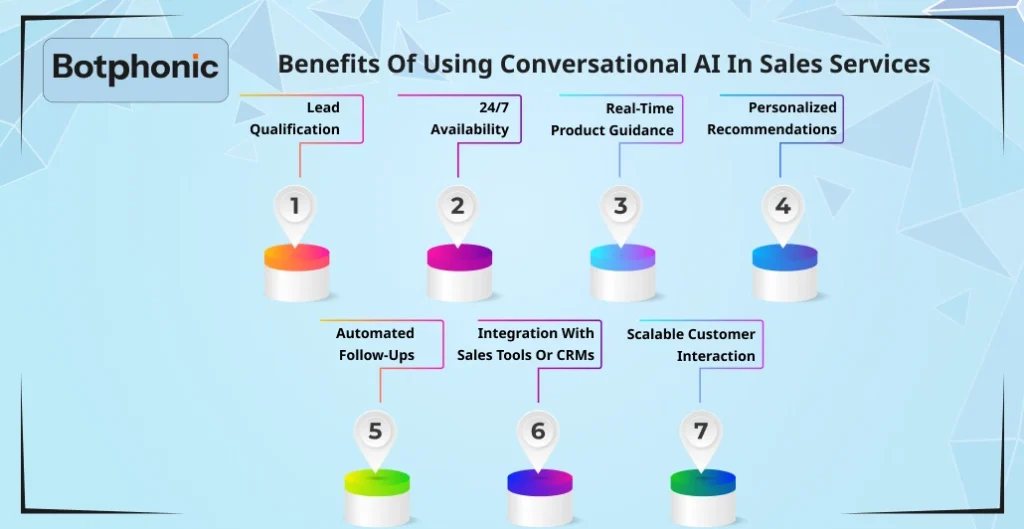
1. Lead Qualification
- AI bots help ask direct questions, which identifies serious buyers and the casual visitors.
- It nurtures the potential leads with relevant content or follow-up messages until they are ready to proceed with the buying stage.
2. 24/7 Availability
- AI customer service provider never takes rest, it will always be there to assist handle queries, offer demos, or even guide purchases anytime required.
- It can be essential for global sales and e-commerce to increase their customer base.
3. Real-Time Product Guidance
- By incorporating AI customer service agent, in your system it will help your customer choose the right product based on their budget, preference, and need.
- It reduces decision fatigue and saves users from confusion by boosting their confidence.
4. Personalized Recommendations
- It can use browsing history, preferences, and user behavior to suggest similar products or offers.
- By using AI for customer support solutions, you can see an increase in cross-selling and upselling too.
5. Automated Follow-ups
- AI assets you in reminding the customer about the abandoned carts, unfinished application, or even the expiring offers.
- It keeps lead in touch without any human effort.
6. Integration with Sales Tools or CRMs
- Using AI for customer service solutions can help you log interactions into CRM systems to integrate the data as well.
- It keeps sales teams informed and well-aligned without any manual effort.
7. Scalable Customer Interaction
- Incorporating useful AI tools for customer support can help you engage numerous users at once, which will help your sales team to focus on high-value prospects.
What are Customer Services?
Customer services are the support and assistance that companies provide to help customers throughout their buying process, whether it’s before, after or during the purchase. Their main goals are to provide solutions, answer product or service related questions, and offer a positive customer experience.
Few Examples of Customer Service
- Answering product or service inquiries
- Handling complaints or returns
- Providing technical support or troubleshooting
- Assisting with billing or account issues
- Tracking orders or delivery problems
- Offering how-to guides and onboarding support
These services are typically delivered via phone, email, live chat, social media, and these days usually by conversational AI.
Why Conversational AI Matters in Customer Services?
With conversational AI present, it helps offer instant, intelligent, and cost-effective support to our customers. It helps organizations meet rising customer expectations.
Benefits of Using Conversational AI in Customer Services
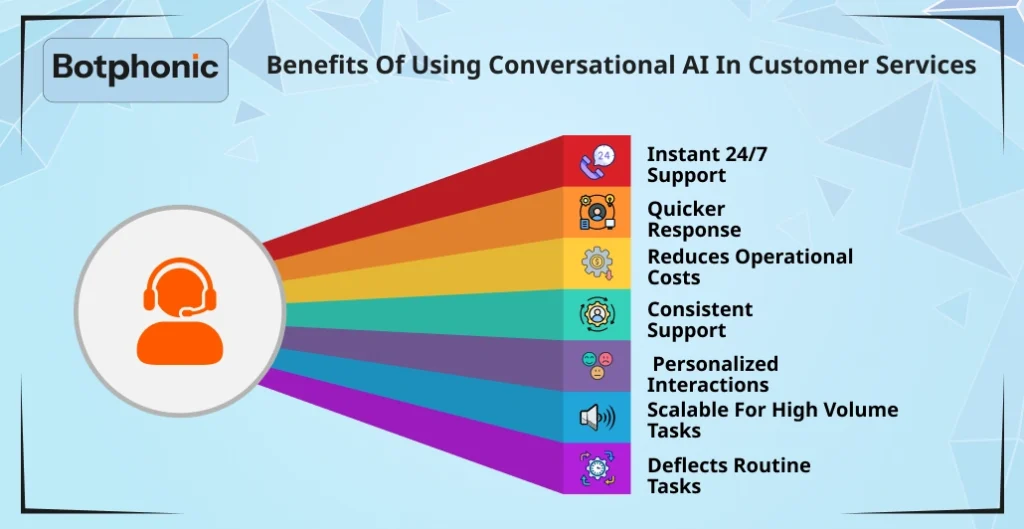
1. Instant 24/7 Support
- With AI based customer support, you can ensure that you are available for your customer anytime they need help, it’s not just about business hours anymore.
- AI powered chatbots will always be there to provide round-the-clock assistance.
2. Quicker Response
- AI customer service platforms will help you provide answers instantly, reducing wait times.
- It can easily handle questions like “How do I reset my password?” or “What’s your exchange policy?” within seconds.
3. Reduces Operational Costs
- Using AI for contact centers will help you reduce the urgency for call center teams.
- It can handle thousands of conversations simultaneously at lower cost than having human agents.
4. Consistent Support
- With conversational AI customer service it always gives accurate, standardized answers every time.
- With no mood-swings, fatigue or misunderstanding due to emotions, AI is less prone to making errors.
5. Personalized Interactions
- Implementing AI customer service solutions in your system can help you provide tailored support.
6. Scalable for High Volume Tasks
- With sudden increase in tasks during product launch or holiday sales AI can handle it easily freeing the representatives.
7. Deflects Routine Tasks
- AI helps lower burden over human agents by taking over tedious tasks.
- It helps human representatives to focus on complex or emotional cases.
Criteria to Choose Right Conversational AI
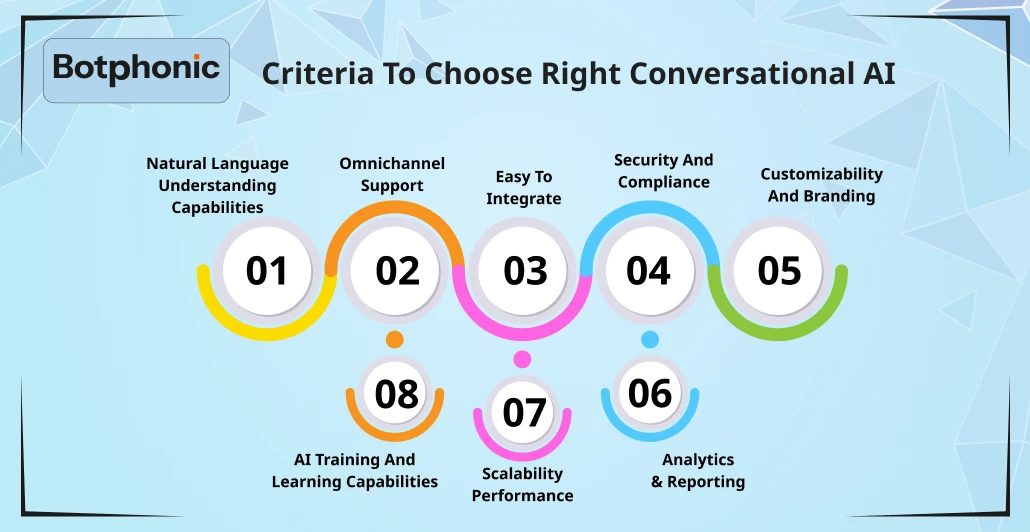
After knowing the benefits, who wouldn’t want to implement AI in their business but selecting the best conversational AI tool requires evaluating technical capabilities, business needs and user experience.
Let’s go through some essential components of perfect conversational AI to help you choose better.
1. Natural Language Understanding Capabilities
- Can you AI understand diverse language and user inputs, slangs, and intent?
- Does it support multiple languages and dialects?
- Can it effectively handle spelling mistakes and varying phrasing?
Select tools with adaptive language processing.
2. Omnichannel Support
- Can it be implemented across web, mobile apps, messaging apps, and voice platforms or is just for mono use?
- Does it offer a consistent experience over all the channels?
Always look for a platform that supports unified and cross-platform engagement.
3. Easy to Integrate
- It should be easy to connect with CRM, ERP, banking system, e-commerce platforms, and even the help desk tools.
- Does it support API and webhooks personalize integration?
It should integrate into your tech stack effortlessly.
4. Security and Compliance
- Does it comply with ethical standards, especially in banking and healthcare?
- Does it offer data encryption, user authentication, and secure hosting?
Ensure that security is non-negotiable for you and your customer, especially for sensitive industries which are prone to fraud such as banking or healthcare.
5. Customizability and Branding
- Does it offer customization in tone, voice, conversation flows, and interface to match your brand.
- Is it available for culturally adaptive interactions?
Always look for flexibility to express your unique brand voice.
6. Analytics and Reporting
- Is it capable of providing real-time insights into user behaviour, satisfaction, and performance.
- Can it help you track KPIs like response time,CSAT, conversion rate, etc.?
You should always take data-driven decisions based on detailed reports.
7. Scalability and Performance
- Can it handle high conversation volumes during peak times?
- Is the infrastructure cloud based and resilient?
Choose AI that ensures you to grow along with your business.
8. AI Training and Learning Capabilities
- Can the system learn from new inputs and share improved results automatically?
- Is it easy to update and train the AI with new data?
Ensure that the platform you chose evolves with time.
Why Botphonic?
Botphonic is a powerful Conversational AI platform which is designed just to transform customer experience across industries, especially in sectors like banking, retail, and customer services. With advanced integrated Natural Language Understanding and multilingual capabilities, it understands complex user queries. Botphonic offers omnichannel support along with API and CRM integration too.
Conclusion
In today’s competitive landscape of organizations, customer experience is key to your growth. Incorporating conversational AI along with your business strategies will help you curate a new and fine customer base. By using AI powered contact center solutions and tools you can deliver intelligent, scalable and secure conversions. Delivering support 24/7 and personalized engagement will only help you grow exponentially.

